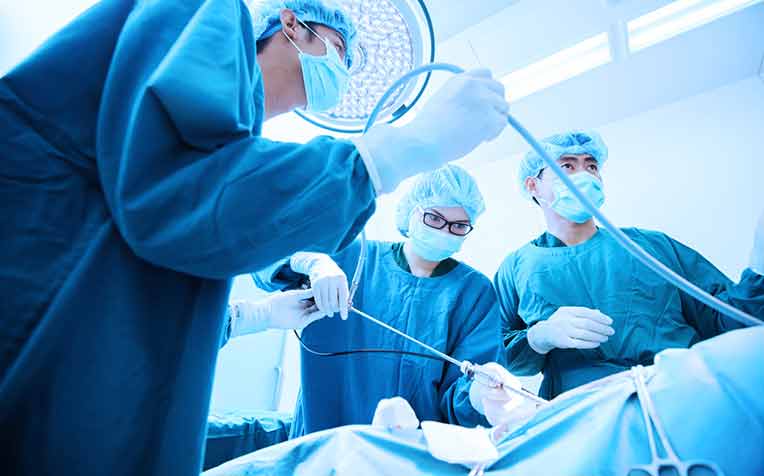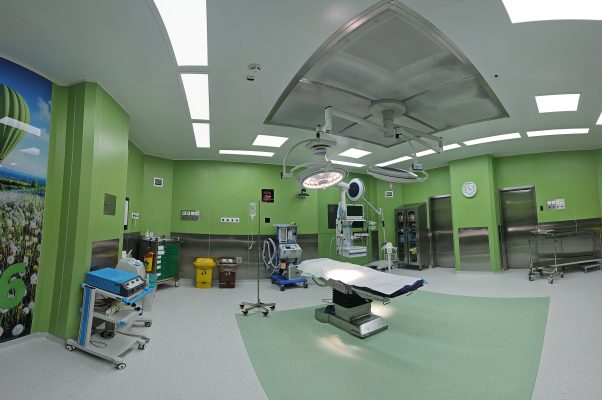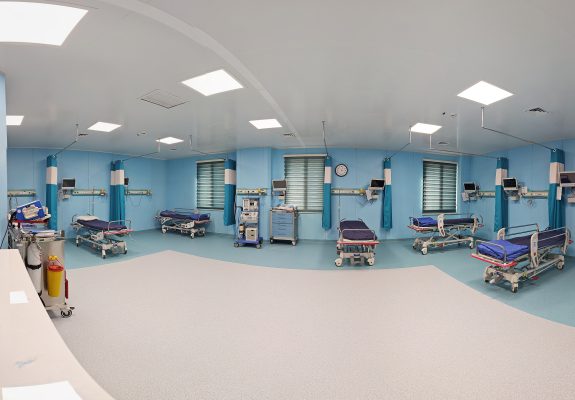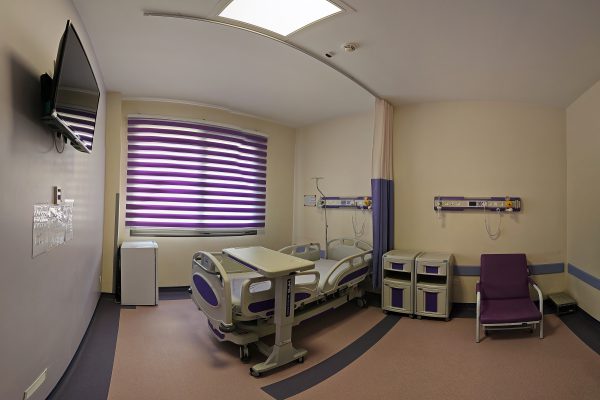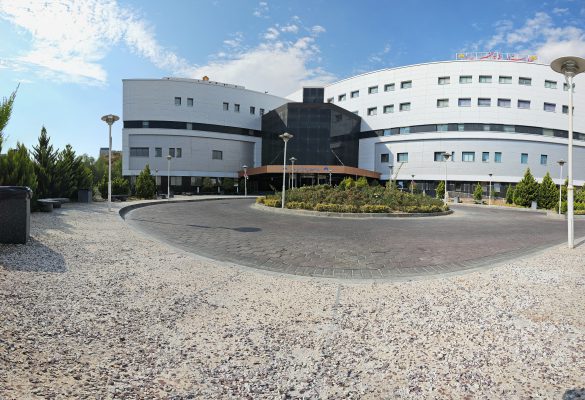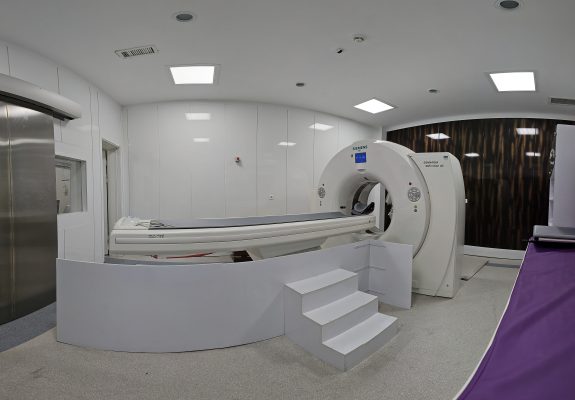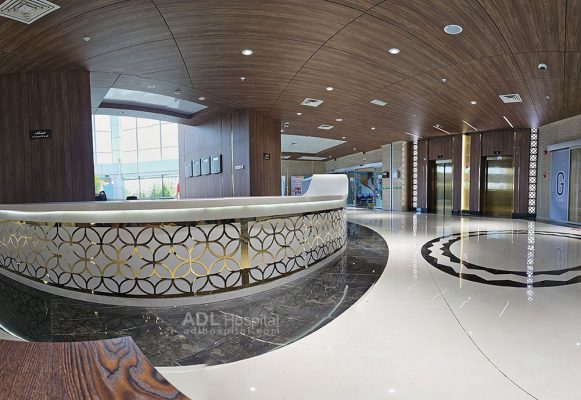Rectal and Colon cancer surgery in Iran
Surgery is a common treatment for Colon cancer surgery in Iran and rectal cancer (collectively referred to as colorectal cancer), and the type of surgery depends on the stage and location of the cancer, as well as the patient’s overall health. Here are the primary types of surgery used in the treatment of colorectal cancer:
Surgery for Colon Cancer:
1. Polypectomy and Local Excision
For very early-stage Colon cancer surgery in Iran, a polypectomy — removal of polyps during a colonoscopy — may be sufficient. If the cancer is slightly larger, a local excision may be performed, removing the cancer and a small amount of surrounding tissue.
2. Partial Colectomy (Segmental Resection)
The most common surgery for Colon cancer surgery in Iran is a partial colectomy, which involves removing the part of the colon that contains the cancer, along with a margin of normal tissue on either side. Lymph nodes near the area are also typically removed for pathology examination.
3. Total Colectomy
In some cases, particularly when a person has a genetic predisposition to develop multiple cancers in the colon, the entire colon may be removed.
4. Laparoscopic Surgery
Laparoscopic surgery is a minimally invasive technique that can be used for some colectomies. The surgeon makes several small incisions and uses special instruments to remove the part of the colon with cancer.
Surgery for Rectal Cancer:
1. Local Excision (Transanal Resection)
For small, early-stage cancers located close to the anus, a local excision may be possible using special surgical tools inserted into the rectum.
2. Low Anterior Resection (LAR)
For cancers in the upper part of the rectum, a low anterior resection may be performed. The surgeon removes the cancerous portion of the rectum and then reconnects the remaining rectum to the Colon cancer surgery in Iran.
3. Abdominoperineal Resection (APR)
If the cancer is located very close to the anus, an abdominoperineal resection may be necessary. This involves removing the anus, rectum, and sigmoid colon, resulting in the patient needing a permanent colostomy.
4. Total Proctocolectomy with Ileostomy
In cases where the cancer involves most of the rectum and Colon cancer surgery in Iran, or in cases of familial adenomatous polyposis or inflammatory bowel disease, the entire colon and rectum may be removed. An ileostomy is created to allow stool to exit the body into a colostomy bag.
5. Pelvic Exenteration
In advanced or recurrent cases where the cancer has spread to nearby organs, a more radical surgery may be performed, which involves removing the rectum, along with other organs such as the bladder, prostate, or uterus.
Additional Considerations:
– Lymph Node Dissection: During Colon cancer surgery in Iran or rectal cancer surgery, nearby lymph nodes are usually removed and tested for cancer.
– Ostomy: Depending on the extent of the surgery, some patients may require an ostomy, which is an opening in the body for the discharge of body wastes.
– Minimally Invasive Techniques: Whenever possible, surgeons may use laparoscopic or robotic techniques to reduce recovery time and the risk of complications.
Risks and Complications:
– Complications from colorectal surgery can include bleeding, infection, leakage from the site where the intestines are reconnected, blood clots, and damage to nearby organs.
– Long-term issues may include changes in bowel habits, the need for a permanent ostomy, and sexual or urinary dysfunction.
Recovery and Follow-up:
– Post-operative care is essential for monitoring recovery, managing complications, and detecting any signs of cancer recurrence.
– Patients may need additional treatments such as chemotherapy or radiation therapy after surgery, depending on the stage of cancer and other factors.
A multidisciplinary team approach involving surgeons, oncologists, radiologists, pathologists, and other healthcare professionals is vital to provide comprehensive care for colorectal cancer patients. The specifics of each surgical procedure and the decision-making process are personalized to each patient’s unique situation.
Colon and rectal cancer surgery is required for which patients?
Rectal and Colon cancer surgery in Iran is typically required for patients who have been diagnosed with colorectal cancer. The decision to recommend surgery and the type of surgery depends on several factors:
Stage of Cancer
- – Early-stage cancer (Stage 0, I, and some Stage II): Surgery may be the primary treatment. For very early cancers, less invasive surgeries such as polypectomies or local excisions might be sufficient.
- – Locally advanced cancer (some Stage II and Stage III): Surgery to remove the section of the colon or rectum containing the cancer along with nearby lymph nodes is usually the main treatment. It may be combined with chemotherapy and/or radiation therapy.
- – Stage IV cancer: If the cancer has spread to other parts of the body (metastasized), surgery might be used to remove the primary tumor to prevent complications like bleeding or blockage. Surgery might also be considered to remove metastases if they are limited and can be completely removed.
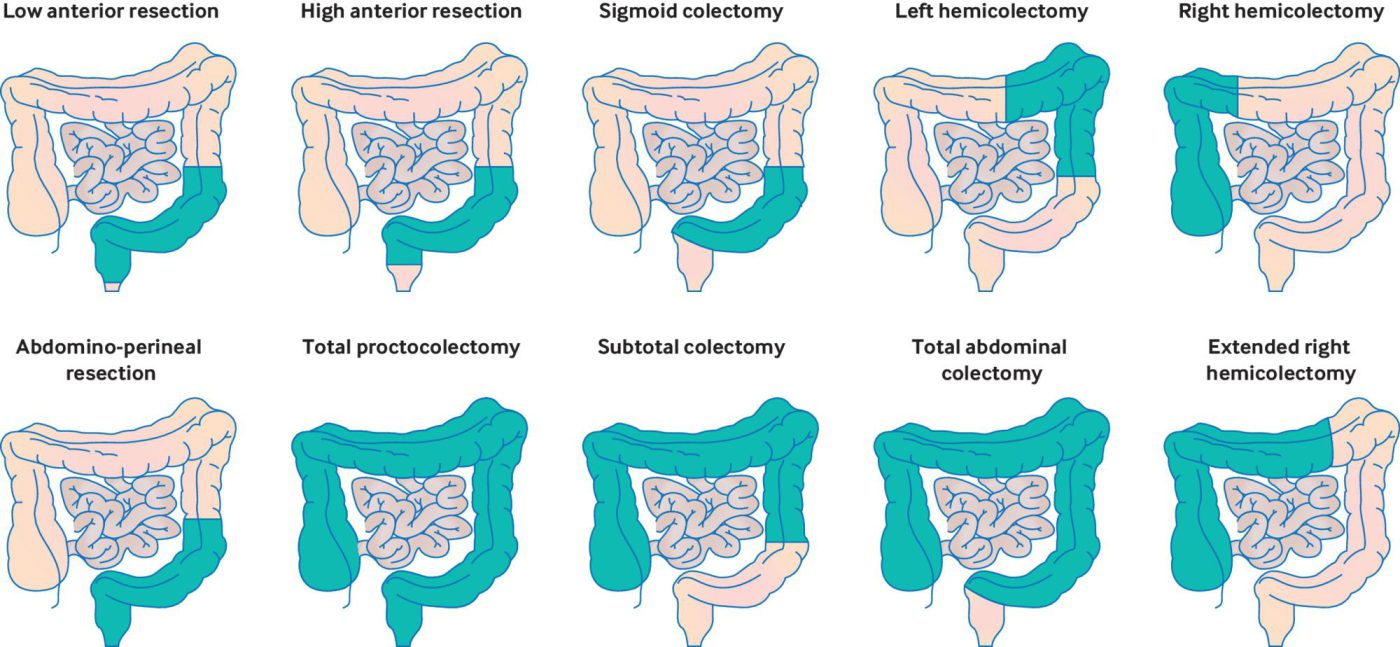
Location of the Tumor
– Colon Tumors: Depending on the location and size of the tumor in the colon, a partial colectomy or more extensive surgery may be necessary.
– Rectal Tumors: The approach to rectal cancer surgery can be more complex due to the limited space in the pelvis and the proximity to the anal sphincter and other organs.
Patient’s General Health
– A patient needs to be fit enough to undergo surgery, which typically involves anesthesia and a recovery period. Coexisting medical conditions can influence the type of surgery and whether surgery is an advisable option.
Risk of Recurrence and Spread
– Surgery is often recommended to reduce the risk of recurrence and to remove any lymph nodes that may contain cancer cells.
Symptomatic Relief
– In advanced cases, surgery may be used to relieve or prevent symptoms such as obstruction, bleeding, or pain, even if it’s not expected to cure the cancer.
Patient’s Preferences and Quality of Life
– The patient’s own choice and willingness to undergo surgery, potentially live with an ostomy, and their personal values and goals of care are considered.
Genetic Conditions
– In cases of hereditary cancer syndromes, such as Lynch syndrome or familial adenomatous polyposis, more extensive surgery may be recommended to prevent cancer.
Preventive Measures
– Patients with certain conditions like extensive ulcerative colitis or familial cancer syndromes may undergo surgery to remove the colon or rectum to prevent cancer.
Before deciding on surgery, patients will typically undergo a thorough preoperative evaluation, which includes imaging studies and possibly genetic testing, to determine the extent of the cancer and the best surgical approach. Multidisciplinary teams work to craft the optimal treatment plan which can include a combination of surgery, chemotherapy, radiation therapy, targeted therapy, and immunotherapy, depending on the individual case.
Types of colon and rectal cancer surgery
1. Local Excision:
– Involves removing the tumor without affecting nearby lymph nodes or surrounding tissues.
– Used for small, early-stage tumors confined to the inner lining of the colon or rectum.
– Can be performed through a colonoscopy or laparoscopic surgery.
2. Segmental Resection:
– Removal of a portion of the colon or rectum containing the tumor and a margin of healthy tissue on either side.
– Lymph nodes near the tumor may also be removed for examination.
– Performed for larger tumors or those that have spread to nearby tissues.
– Can be done through open surgery or laparoscopically.
3. Colectomy:
– Removal of the entire colon, including the ascending, transverse, and descending colon.
– Performed for extensive tumors involving the majority of the colon.
– May be combined with a proctectomy if the rectum is also affected.
4. Proctectomy:
– Removal of the rectum, which is the final portion of the large intestine.
– May be performed alone or in combination with a colectomy.
– Depending on the extent of the tumor, the surgeon may create a permanent colostomy or perform an anastomosis to reconnect the remaining colon to the anus.
5. Abdominoperineal Resection (APR):
– Removal of the rectum, anus, and surrounding tissues, including the pelvic lymph nodes.
– Performed for advanced rectal cancers that have spread to nearby structures.
– Results in a permanent colostomy.
6. Low Anterior Resection (LAR):
– Removal of the lower part of the rectum and surrounding tissues, preserving the anal sphincter.
– Performed for rectal tumors located low in the rectum but not involving the anal sphincter.
– May be followed by a temporary colostomy to allow the anastomosis to heal.
7. Intersphincteric Resection (ISR):
– Removal of the rectum while preserving both the anal sphincter and the internal anal sphincter.
– Performed for small, early-stage rectal tumors located high in the rectum.
– Allows for preservation of bowel function and continence.
What happens in colon cancer surgery?
Colon cancer surgery in Iran typically involves the following steps:
1. Preoperative Preparation:
– The patient undergoes a thorough medical evaluation to assess their overall health and fitness for surgery.
– This may include blood tests, imaging studies, and a colonoscopy to dokładnie examine the tumor and determine its location and extent.
– The patient may also be advised to quit smoking, lose weight, and adjust their diet to improve their overall health and reduce the risk of complications.
2. Anesthesia:
– General anesthesia is typically used during colon cancer surgery to ensure the patient is completely unconscious and pain-free during the procedure.
3. Surgical Approach:
– The surgical approach depends on the location and extent of the tumor, as well as the patient’s overall health and preferences.
– Open surgery: This involves making a single incision in the abdomen to access the colon.
– Laparoscopic surgery: This involves making several small incisions in the abdomen and using a laparoscope (a thin, lighted instrument) to visualize and remove the tumor.
4. Tumor Resection:
– The surgeon identifies and isolates the portion of the colon containing the tumor.
– The affected segment of the colon is carefully removed along with a margin of healthy tissue to ensure complete tumor removal.
– Nearby lymph nodes may also be removed for examination to determine if the cancer has spread.
5. Reconstruction:
– After removing the tumor, the surgeon will reconnect the remaining healthy portions of the colon.
– This may involve creating an anastomosis (a surgical connection) between the two ends of the colon or creating a colostomy.
– A colostomy is a temporary or permanent opening in the abdomen that allows stool to pass out of the body into a collection bag. It may be necessary if the anastomosis needs time to heal or if the rectum has been removed.
6. Wound Closure:
– Once the reconstruction is complete, the surgeon will close the incisions using sutures or staples.
7. Postoperative Care:
– After surgery, the patient will be monitored closely in the hospital for any complications.
– They may receive pain medication, antibiotics, and other medications to prevent infection and promote healing.
– The patient will typically stay in the hospital for several days before being discharged home.
– Follow-up appointments will be scheduled to monitor the patient’s recovery and check for any signs of recurrence.
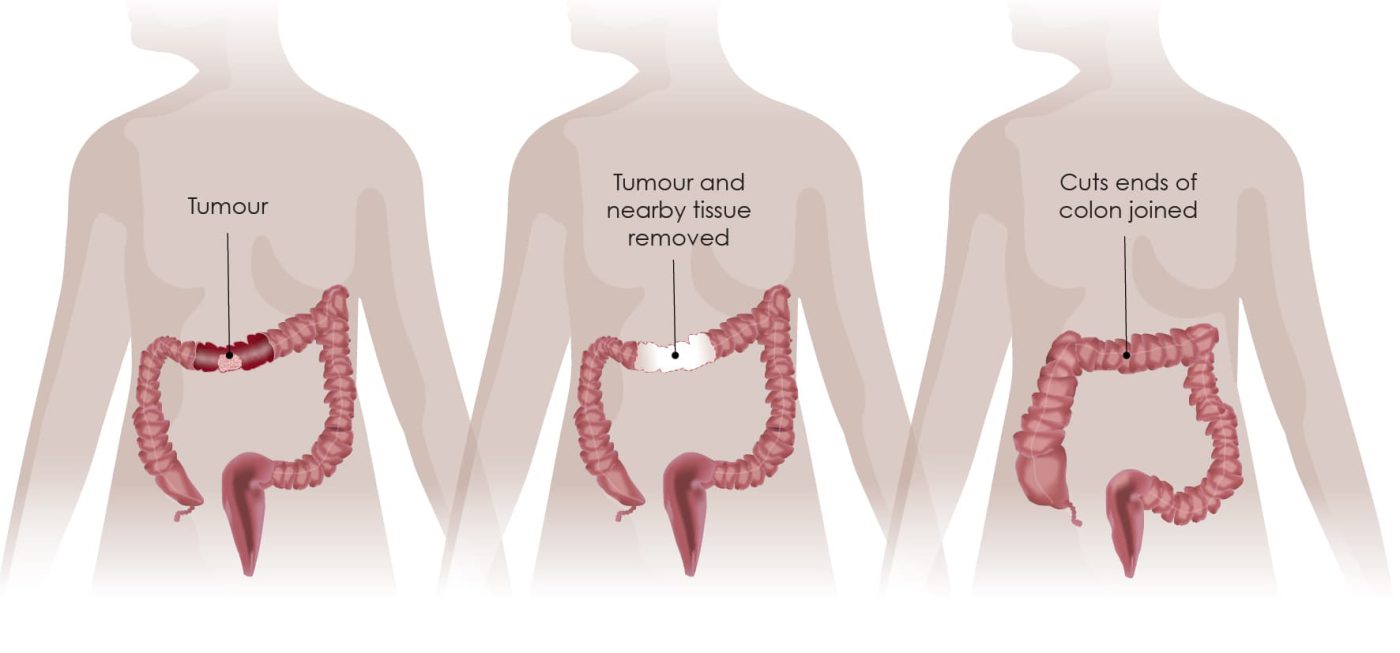
Care after colon and rectal cancer surgery
After colon and rectal cancer surgery, proper care is essential to promote healing, prevent complications, and improve overall outcomes. Here are some key aspects of post-operative care:
1. Pain Management:
– Pain medication will be provided to manage discomfort and pain after surgery.
– The type of pain medication and dosage will be determined by the doctor based on the patient’s individual needs.
2. Wound Care:
– The surgical incision will be covered with a dressing to protect it from infection.
– The dressing should be kept clean and dry, and changed as directed by the doctor or nurse.
– Avoid strenuous activities that could put strain on the incision.
3. Diet:
– Initially, a liquid or soft diet may be recommended to give the digestive system time to rest and heal.
– Gradually transition to a regular diet as tolerated, ensuring adequate intake of fruits, vegetables, and whole grains.
– Avoid foods that may cause gas or constipation, such as beans, cabbage, and spicy foods.
4. Activity:
– Walking and light activities are encouraged to prevent blood clots and promote circulation.
– Gradually increase activity levels as tolerated, but avoid strenuous activities or heavy lifting until fully healed.
5. Bowel Movements:
– After surgery, bowel movements may be irregular or difficult.
– Drink plenty of fluids and eat a high-fiber diet to prevent constipation.
– Stool softeners or laxatives may be recommended if needed.
6. Follow-up Appointments:
– Regular follow-up appointments with the doctor or surgeon are essential to monitor recovery and check for any signs of recurrence.
– These appointments may include physical examinations, blood tests, and imaging studies.
7. Emotional Support:
– Recovering from colon and rectal cancer surgery can be emotionally challenging.
– Talking to a therapist or counselor can help manage emotions and cope with the stress of cancer and its treatment.
– Support groups for cancer survivors can also provide a sense of community and shared experiences.
8. Ostomy Care (if applicable):
– If a colostomy or ileostomy was created during surgery, the patient will need to learn how to care for and manage the ostomy.
– This includes changing the ostomy bag, preventing skin irritation, and managing any complications that may arise.
9. Cancer Surveillance:
– After surgery, regular surveillance is recommended to monitor for any signs of cancer recurrence or new primary cancers.
– This may include colonoscopies, imaging studies, and blood tests.
10. Lifestyle Changes:
– Maintaining a healthy lifestyle after surgery can help reduce the risk of cancer recurrence and improve overall health.
– This includes eating a balanced diet, exercising regularly, maintaining a healthy weight, and quitting smoking.
If you want to operate in Tehran Adl Hospital, click the button below and follow the steps


